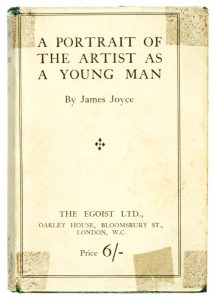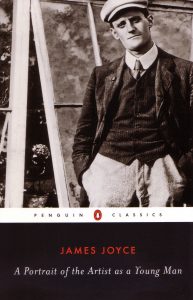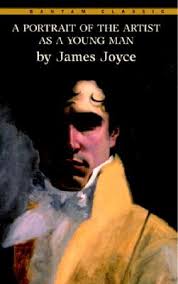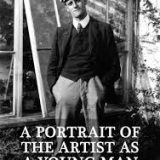A Portrait of the Artist as a Young Man – James Joyce – 1916

Reviewed by: Jim Date: 1 August 2003
Joyce was not only a superstitious man but also a perplexed man. To really appreciate what he was trying to achieve one needs to go beyond the surface, the apparent reading, and see how it all connects. When I first read Araby in Dubliners I thought, wow, this is just, okay, at best. But then by reading critical works and giving the story numerous readings, I was amazed how it grew on me…
 Joyce is a symbolist, a modernist, he was one that didn’t try anything twice. Hence, his style developed into something totally experimental by the end of his career, just take a look at Finnegan’s Wake to find that out. Joyce’s genius lies in the fact that he didn’t do something twice, that he was as he said, an artist, not a writer. He wanted to take writing to the next level, like many modernists–consider T.S Elliot’s innovativeness, for instance. He like Elliot wanted to transform consciousness, wanted to put it into writing instead of being the Victorian’s henchman all over again. Tradition, morality, doing things the way things ought to be done, no, this wasn’t Joyce, this wasn’t Elliot or Pound for that matter. I’d recommend reading a few critical works along with Portrait to get a good idea of what Joyce was grabbling with here…true, he lived in another time, but this just doesn’t complete the picture. One needs to truly understand the vices that we’re keeping his artistic vision down, to truly experience that, and to truly see what he had achieved to come to fully appreciate the man…
Joyce is a symbolist, a modernist, he was one that didn’t try anything twice. Hence, his style developed into something totally experimental by the end of his career, just take a look at Finnegan’s Wake to find that out. Joyce’s genius lies in the fact that he didn’t do something twice, that he was as he said, an artist, not a writer. He wanted to take writing to the next level, like many modernists–consider T.S Elliot’s innovativeness, for instance. He like Elliot wanted to transform consciousness, wanted to put it into writing instead of being the Victorian’s henchman all over again. Tradition, morality, doing things the way things ought to be done, no, this wasn’t Joyce, this wasn’t Elliot or Pound for that matter. I’d recommend reading a few critical works along with Portrait to get a good idea of what Joyce was grabbling with here…true, he lived in another time, but this just doesn’t complete the picture. One needs to truly understand the vices that we’re keeping his artistic vision down, to truly experience that, and to truly see what he had achieved to come to fully appreciate the man…
His Ulyssees was considered the best work of the 20th century by the New York Times, so just because he seems difficult or out-of-reach doesn’t mean he sucks…
I disagree fully with the one post on here saying Joyce couldn’t measure up to others–but in a way, that’s true, Joyce is Joyce pal! And don’t let your reason get the best of you–Joyce isn’t easy to read or understand, but that doesn’t make him 3rd rate or a hack as you lead on…
~
Reviewed by: Tony Thomas Date: 27 May 2002
 I richly enjoyed Michael’s appreciation of Joyce, particularly of this book. I had to read this at school when I was 15 and I have reread it a few times since then. It always seems to be a book that only someone who had been a purely pre-Vatican II Catholic virginal boy who believed in the immaculate conception, could truly understand and live in, a book Mr. Biswas would laugh away as white folks got no sense book.
I richly enjoyed Michael’s appreciation of Joyce, particularly of this book. I had to read this at school when I was 15 and I have reread it a few times since then. It always seems to be a book that only someone who had been a purely pre-Vatican II Catholic virginal boy who believed in the immaculate conception, could truly understand and live in, a book Mr. Biswas would laugh away as white folks got no sense book.
Michael hits the nail on the head here.
Note: An addenda to the previous comment, I was myself a catholic virginal boy who believed in the immaculate conception. I much prefer the current me a lecherous, atheistic communist, although I still have the 1950s Baltimore Catechism I excelled at back in those preVatican II days.
~
Reviewed by: Michael Sympson Date: 7 September 2001
When I was much younger and naive, I had read every single line of Joyce, including his letters and poems and even Finnegan’s Wake (what a waste of time). I can’t help it, the man was an amateur for all his life, a typical tinkerer and home improvement guy who probably never really found the kind of subject matter that could have distracted him from his self-consciousness. His short stories would barely be remembered these days if there wasn’t his name under the title. They are imitation pieces, ventriloquistic exercises, and pretty flat and lifeless if held against Chekhov and Kipling, or Flaubert and Kathleen Mansfield.
Joyce had his fair share of difficulties like everyone of us and at some point threw a Manuscript of 2,000 pages into the fireside. The legend goes that his sister Eileen rescued parts of it from the fire. (A similar legend surrounds the first draft of Nabokov’s “Lolita.”) Joyce re-edited the remainders and with the help of Ezra Pound it was published under the title of “A Portrait of the Artist as a Young Man.” Much later the remainders of the original draft appeared as “Stephen Hero.” If it had survived in full it would probably have been a very long and rather insufferable autobiographical novel about a clever young man realizing that he’s too good for the society into which he’s been born.
An attitude the author never really changed: take for instance “Nausicaa,” the notorious masturbation scene in “Ulysses.” Superbly written as it is, it gives us the whole deficiency of Joyce in a nutshell. He imitates the presumptuous and pompous phrasing in certain fashion magazines of the period, but just tell me to what end? Is it to poke fun on the cliche beset thoughts of the crippled girl? Well I fail to see the joke, this is just cruel. Satire either attacks a subject that has the capacity to bite back, or it is merely an act of snobbery. Joyce, the writer, was a rather small character and in the sentiment of his period thought it to be cool to be “anti-philistine.”
Apparently “Dubliners” and “Portrait” and especially “Ulysses” were written by an author who went on a quest for his own style. Finnegan’s Wake eventually was the place where the eagle landed. I don’t think I am alone in my opinion that Joyce had landed on the most barren rock in the entire Universe. Joyce had tons of talent to burn, but something went seriously wrong here. I am all for modern art, and consider the term “post modern” a phony contradiction in terms. But lesser talents accomplished more – DosPassos, O’Neil, Kafka, Proust, Marianne Moore, Auden, Hemingway, Nabokov, they all have their moments, even clowns like Bukowski and Douglas Adams (who is a linguistic genius in his own right.) Borges could put in 3 lines what took a Joyce 30 strenuous pages without ever achieving a comparable impact. With one exception.
If we compare the “Portrait” with the leftovers from “Stephen Hero” we can see what good editing can accomplish. Joyce was very fond of copiously scribbling in the margins of the galley proofs, so the improvements in style are probably entirely his. The overall structure though (like that of T.S. Eliot’s “Wasteland”) might be based on suggestions by Ezra Pound. Pound also helped Joyce to find a publisher for the “Portrait.” It was the time when Joyce had been in his Flaubertian phase and emulated the Frenchman’s method to present events strictly from the protagonist’s perspective and in terms of the character’s faculties of perception. And what an emulation it is.
Style is the most direct access to an artist’s temperament. Narrative style is a conveyor – only in essays and poems style is allowed to be a player. Approaching Joyce is an experience not dissimilar to “The Approach to Al-Mu’tasim.” After crossing through all the veils we step into an entirely empty room, like the Holy of Holies in the Jewish temple. Beyond the private circle of his life, Joyce had nothing to say. Catholicism and Thomas Aquina’s philosophy leave you badly prepared, not only for the second law of thermodynamics and Special Relativity, but for democracy, a truly free Ireland, or sex with your wife, and life in general.
 Only in the “Portrait” Joyce managed to bring all the pieces together, and though I must say, that the throes of adolescence in the clutches of Catholicism’s screwed morality and hygiene make not exactly my favorite read, what counts is HOW Joyce brings across his story. And he does it brilliantly. The book is full of flavors and sensuality. We hear the dull thud of the wet leather ball on the rugby pitch, shiver in the clammy dormitory, feel the slight vertigo of Stephen’s trance in the rocking train compartment. All this is fine writing except for the first part, when Joyce attempted to reproduce the mind-set of a small boy.
Only in the “Portrait” Joyce managed to bring all the pieces together, and though I must say, that the throes of adolescence in the clutches of Catholicism’s screwed morality and hygiene make not exactly my favorite read, what counts is HOW Joyce brings across his story. And he does it brilliantly. The book is full of flavors and sensuality. We hear the dull thud of the wet leather ball on the rugby pitch, shiver in the clammy dormitory, feel the slight vertigo of Stephen’s trance in the rocking train compartment. All this is fine writing except for the first part, when Joyce attempted to reproduce the mind-set of a small boy.
His choice of words comes a tat too cute and betrays the condescending adult. Joyce was certainly not a Tolstoy, even not a Kipling. Nabokov’s “Speak Memory” is a fine description of early childhood that respects the child. Joyce of course had no intention to glorify this particular childhood, or to be objective. He wrote out of his bitterness of something to be left behind, and the sooner the better. So the ventriloquism sometimes comes on a false note. Still with all these minor flaws, this is a major novel in the language and must read for the aspiring author.
















